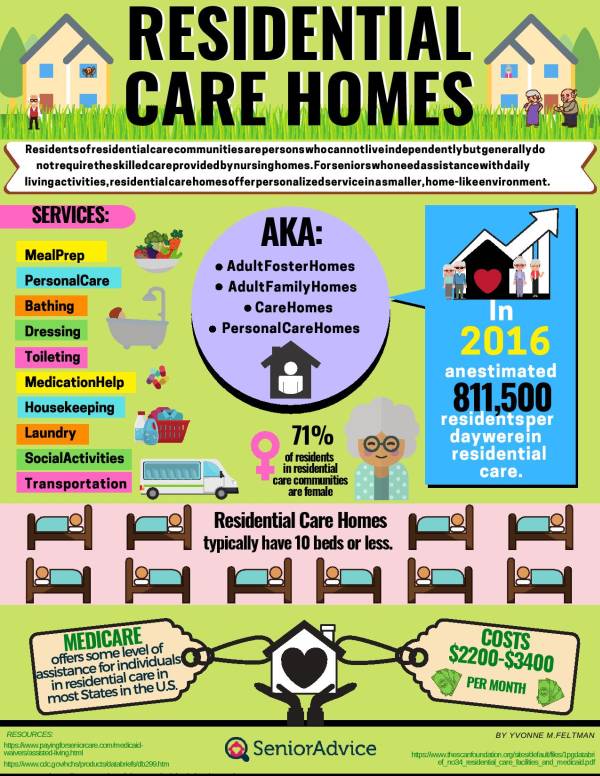About Residential Care Homes

Residential care homes are also known as adult foster homes, adult family homes, care homes, personal care homes, and more. This type of care facility typically offers a small group care service in a residential home. They are usually required to be licensed as residential care facilities but may offer fewer services and amenities than larger assisted living communities. They offer basic lodging in either a private or shared room, meals and nutrition support, and assistance with basic living activities such as dressing and taking medications. Some may offer more extensive nursing and medical support as well.
Top Cities for Residential Care Homes in the US
- Miami, FL
- Anchorage, AK
- Phoenix, AZ
- Vancouver, WA
- Tucson, AZ
- Seattle, WA
- Detroit, MI
- Milwaukee, WI
- Lynnwood, WA
- Bellevue, WA
- Baltimore, MD
- Houston, TX
- Scottsdale, AZ
- Spokane, WA
- Renton, WA
- Las Vegas, NV
- Shoreline, WA
- Tacoma, WA
- Racine, WI
- Everett, WA
- Grand Rapids, MI
- Flint, MI
- Kent, WA
- Olympia, WA
- San Jose, CA
- Federal Way, WA
- Bothell, WA
- San Francisco, CA
- Portland, OR
- Hialeah, FL
More About Residential Care Homes
Residential care homes are also known as adult foster homes, adult family homes, care homes, and personal care homes. For seniors who need assistance with daily living activities, residential care homes offer personalized service in a smaller, home-like environment.
What is a Residential Care Home?
Residential care homes are an alternative to assisted living communities or home care. They typically provide services to less than ten residents, which may feel more comfortable for seniors who are nervous about moving into senior care. Care homes offer a private or semi-private room, meal preparation, housekeeping, laundry, social programs, medication management and transportation. However, they do not typically have a medical professional on-site. Limited, part-time medical care may be offered, but it's not a primary focus of this type of senior living community.
Residential care homes are not regulated nationally like nursing homes. Each state has its own laws, regulations and licensing standards. Since there are many terms for this type of living arrangement and they may or may not reflect official state requirements, we recommend contacting your state's licensing authority to understand the level of care and services provided.
What is the Difference Between Residential Care and Assisted Living
Although they offer very similar experiences, residential care facilities are often smaller than assisted living facilities. It varies by state, but the resident occupancy size for a residential home is the ability to provide beds for at least three residents. Not unlike assisted living, some residential care homes can have skilled nursing staff in addition to lower levels of staff to provide 24-7 care. However, as noted above, this is not a primary focus for residential care.
Both assisted living homes and residential care communities provide studio rooms or one-bedroom apartments, solo or shared, with private bathrooms. Additional services include meals, social activities, laundry, and housekeeping services among others. As with any long-term senior housing, residential care homes vary by area, in size, amenities, cost and services so it is important to do research and ask questions.
Residential Care vs. Home Care
With a lessening ability to maintain everyday tasks, elders may benefit from the 24-7 access to support that a residential care home provides. On the other hand, in-home care allows the individual to stay functioning at home in a more private setting while a home health aide or nurse makes daily visits (that can extend to 24-hour care). Although usually less expensive than residential care, home care costs can add up if a lot of specialized services are needed. An individual with more care needs can often pay less monthly when choosing to relocate to a residential care community. Preference of community size, personal abilities and cost are the most determining factors in choosing the right care community for a senior loved one.
How to Know if Residential Care is a Good Fit
My loved one can walk or move around well on his/her own.
Residential care residents generally must be able to get around on their own. Although walkers and canes are okay, bedridden seniors are not good candidates. Seniors in wheelchairs should explore the accessibility of the care home.
My loved one doesn't have late stage Alzheimer's or dementia.
While residential care homes may be able to care for people with early to moderate dementia, they are usually not equipped to care for people in the advanced stages. In this case, dedicated memory care is required.
My loved one doesn't need medical attention on an ongoing basis.
Residential care homes can offer a high level of care with activities of daily living such as bathing, dressing, toileting and so on, but this kind of care is considered non-medical. If your loved one needs medical attention from a doctor or nurse on an ongoing basis, nursing homes are better equipped to handle this need. If your senior needs short-term care (from hospitalization or surgery), they could be placed at a nursing home and be covered by Medicare for up to 100 days. After the rehabilitation process, they could transfer to residential care home if they no longer need ongoing medical services or physical therapy.
My loved one is introverted, resistant to moving, and/or would like privacy.
For seniors who highly value their privacy, a residential care home may be a better fit than an assisted living community. Residents have independence, but they also always have people around if there is an emergency. They can have a feeling of security without feeling like their day-to-day life is being managed by someone else.
Needs Assessment
Most residential care homes will do an in-house assessment to get a better idea of the senior's current condition, so they can determine what type of care is appropriate for that individual resident. The actual assessment will vary from facility to facility but typically it includes evaluations of the following areas:
- Cognitive Condition - The staff will assess a person's cognitive and mental condition and whether they are experiencing confusion or dementia. They need to know if your elderly relative can follow instructions, suffers from severe memory loss, is prone to wandering off, or has any other issues that could compromise his or her safety.
- Medical Needs - Many seniors have health problems, so the staff will want to know if there is a history of cancer, high blood pressure, past surgeries, heart problems, lung conditions, and so on. They will look for vision and hearing problems and incontinence issues, so they can provide the best care possible. It's also important to share your loved ones' medication list and if any prescriptions need to be administered by an on-staff nurse.
- Special Support - This can be a special diet, assistance with oxygen, or the need for a staff member to push their wheelchair to meals.
- Personal Care and Hygiene Needs - The staff will also need to know how much care your loved one needs when it comes to taking care of personal needs like showering, getting dressed, toileting, and other daily activities.
The residential care home should conduct follow-up needs assessments to determine if an existing care plan is working in the best interest of the senior. Typically, needs assessments will be performed every few months, or when staff members think there are signs of changing or worsening conditions in a resident.
How Much Does Senior Residential Care Cost?
Depending on the level of services and geographic location, residential care is even more affordable than assisted living care and home care. Cost can vary depending on room privacy. According to Genworth.com, a residential care home is approximately $2,200 a month for a shared bedroom and $3,400 a month for a private bedroom. Most residential care homes have private rooms available for their residents as well as shared space.
How Can I Pay for a Residential Care Home?
Considered a long-term care option, residential home care expenses are most frequently paid for out-of-pocket or by a combination of other methods such as Social Security, pensions, Veterans benefits, insurance, home equity, and various savings.
Long-Term Care Insurance
Long-term care insurance is a policy that is purchased through a private insurance company. Like health insurance policies, the price varies greatly depending on age, general health and amount of coverage. Coverage could be denied for people with pre-existing conditions such as Alzheimer's disease or Parkinson's disease. Not all insurance will deny based on these conditions, so it is important to explore different insurance companies.
Medicaid
Medicaid is a Federal and State health insurance program for those with low income and limited assets. Administration of the program varies by state, according to the Centers for Medicare and Medicaid Services (CMS). Medicaid doesn't pay for room and board in these settings, but, depending on the state, Medicaid may pay for services used in conjunction with a facility such as visits from a home health aide to help provide care and to delay the need to move to a more specialized facility such as a nursing home.
Medicare
Medicare is a federal government program for those 65 or older with low income and limited assets. Medicare doesn't pay for residential home care, but it will cover skilled nursing or qualifying home health services that may be used while living in a residential home community.
Aid and Attendance Benefit for Veterans
According to the VA website, the Aid and Attendance (A&A) benefit is a special benefit for war era veterans and their surviving spouses. It is a tax-free benefit designed to provide financial assistance to help cover the cost of long-term care in the home, in an assisted living facility or in a nursing home. This benefit is for those who require the regular attendance of another person or caregiver in at least two of the daily activities of living. To learn more about the eligibility requirements and to apply for these veteran benefits visit VeteransAid.org online.
Reverse Mortgage Loans
The Home Equity Conversion Mortgage (HECM) is a reverse mortgage that seniors take against their home's equity. Insured by the federal government, it is only accessible via lenders approved by the Federal Housing Administration (FHA). Once finalized, the lender makes payments in a single lump sum, monthly installments, or as a line of credit. The loan does not have to be paid back until the last borrower passes away or moves from the home for one full year. The home is usually sold, and the lender is paid back the full loan amount plus interest.
Life Insurance
Some life insurance policies may provide options to help pay for nursing home care. These options greatly depend on the type of life insurance policy so it's best to discuss with an insurance broker or financial advisor.
- Life Settlement - You can sell your life insurance policy to a third party for market value and use the proceeds to fund a long-term care benefit plan.
- Surrender Policy - You give up ownership and the death benefit. If the policy has accumulated cash, the insurance company writes you a check for the full amount of cash value, which is often taxed.
- Policy Loan - You can take a loan from your life insurance policy, which means you won't pay taxes. However, you can't take it all or the policy will lapse.
- 1035 transaction - This allows you to exchange cash value from an existing life insurance policy into a new life insurance policy with long-term care insurance benefits tax-free.
Private Funding
In situations when costs aren't covered through other means, paying via private funds is an option. Sources of private funds for residential care include retirement accounts and 401Ks, savings accounts, annuities and insurance plans (including life settlements), trusts and stock market investments. Home equity and bridge loans can also be used when transitioning to a residential care home or increasing care services. Social Security can be an ideal solution for those who are receiving most of their care, including transportation, medication, and meals, through these facilities.
Evaluating Residential Care Homes
As you begin to tour residential care homes, keep a list of standard questions so you can compare answers across all your contenders. AARP provides a printable resource (with room to write your notes) Caregiver Checklist for Evaluating Assisted Living Facilities. Although geared toward assisted living, almost all the questions apply to residential care homes too. Their checklist covers everything from safety to resident rights to fees.
At the end of your tour, make sure you request the following documents. They can help you compare the details of one facility versus another.
- Sample admission contract
- A copy of the Resident Bill of Rights
- A copy of the most recent survey results from state regulatory inspectors
- A recent list of weekly activities and events
- A recent weekly menu of meals and snacks
Once you've collected all the information, study the fees and the contract. Make sure you understand what services are included in the monthly fee. Find out what is available for extra costs. Take the contract home to look at it thoroughly or to have an elder law attorney look at it.
Don't overlook your instincts. You want your loved one to be safe, happy, and healthy. If something feels "off," it's best to trust your gut, or investigate whatever prompted your concern.
There are many benefits to choosing a residential home such as socialization, safety, meals, transportation and less worry for the family. While this type of living isn't the answer to every elder's needs or budget, it is an option that can contribute to a healthier, happier and longer life in the elder years.
Top Articles in Residential Care Homes
View All
Decorating for Assisted Living
When any senior transitions to a new assisted living facility, it can be a major change in their life. One of the biggest issues that seniors today have with moving to assisted living is that they feel like they are leaving their home and forced into a foreign place. While most seniors are ultimatel...More
Read More
Making Homes Safe for Seniors
While residential senior care facilities have their place, many seniors would prefer to live in their homes for as long as possible. This can make sense from an emotional as well as an economic perspective, especially if a home is already paid for and the family of the senior is looking to avoid the...More
Read More
Regulations for Senior Living
There are many factors to consider when searching for the right senior living facility for your loved one. To make a well-informed decision regarding the facility that you will choose, it can be an excellent idea to do some investigation and to learn about the regulations that senior living...More
Read More

 Your Information is Processing
Your Information is Processing